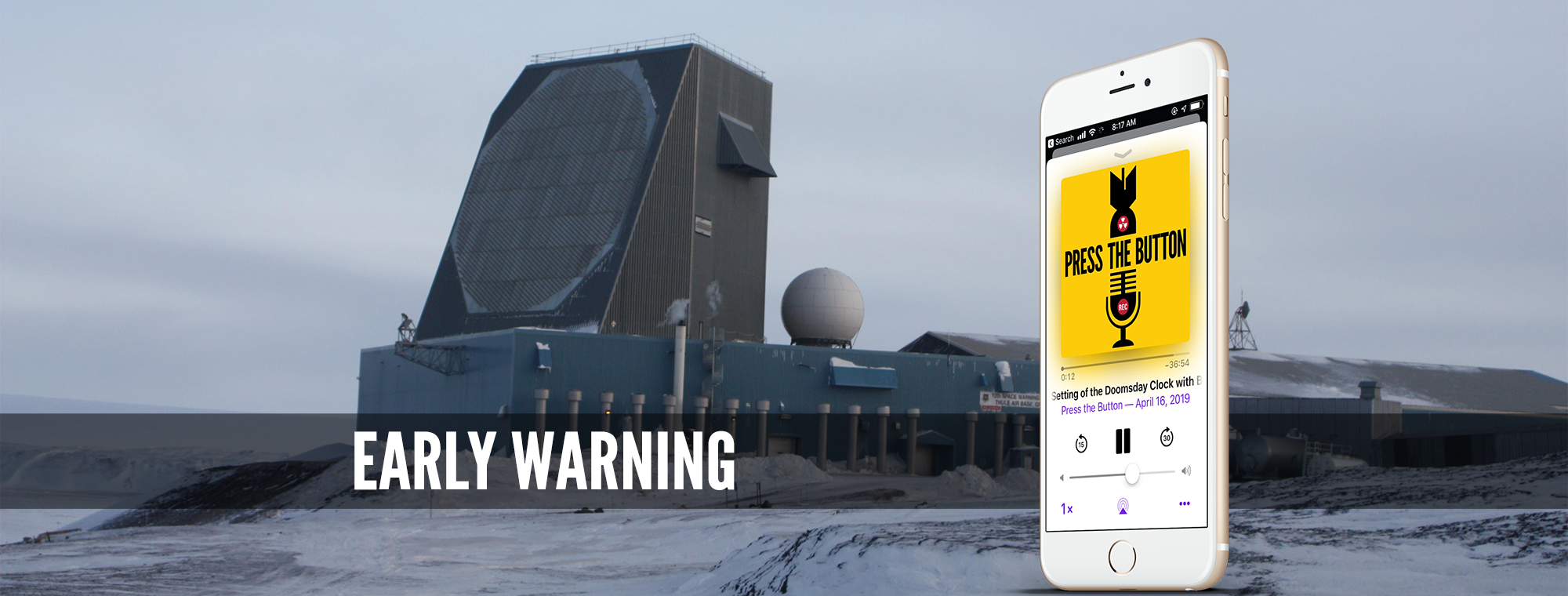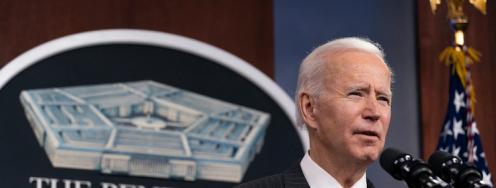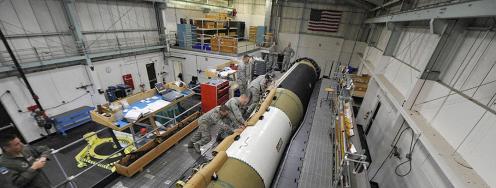This is a transcript of a recent Early Warning segment from the podcast Press the Button, in which Michelle Dover, Mary Kaszynski, and Leon Ratz discuss Iran's latest announcement about its nuclear program, Russia's plans to produce new cruise missiles, and Congress's return to Washington. Listen and subscribe to our weekly podcast today!
Early Warning segment, September 10, 2019
- Michelle Dover, Director of Programs, Ploughshares Fund
- Mary Kaszynski, Deputy Director of Policy at Ploughshares Fund
- Leon Ratz, Senior Program Officer with the Materials Risk Management Program at Nuclear Threat Initiative
MICHELLE: Welcome back to Early Warning. Today I am joined by Leon Ratz, Senior Program Officer in the Materials Risk Management program at the Nuclear Threat Initiative, and Mary Kaszynski, Ploughshares’s very own Deputy Director of Policy. Thank you both for joining me.
MARY: Thanks.
LEON: Pleasure to be here.
MICHELLE: So as you know, Early Warning is our 7-minute news segment. The 7 minutes is about the time the US President would have to respond if he or she got word of an incoming nuclear strike. The clock is ticking. It was a busy week, so let's go. Mary, an official from Iran’s atomic energy organization said on Saturday that Iran now uses advanced centrifuges that can enrich uranium beyond the current levels more efficiently, hence the advanced. Iran has already increased its enrichment level as well as increased it stockpile of enriched uranium and all of this is in response to the failure of the Europeans to offer Iran enough sanctions relief following the US leaving the deal. How does this new announcement affect Iran’s timeline to have enough nuclear material for a nuclear weapon?
MARY: It probably will have an impact on Iran's breakout timeline. But it's really unclear right now because Iran hasn't specified what exact centrifuges they might begin using. It's also very clear, though, that Iran is not sprinting toward a nuclear weapon and that's the really important thing to keep in mind. This is the third step that Iran has taken to reduce its compliance with the JCPOA in response to the US abrogation of the deal. It's a minor step and it's totally reversible. So if the Europeans do come through and provide some economic benefits to Iran, Iran could relatively easily come back into full compliance with the nuclear deal. And they're still complying with the vast majority of its commitments under the nuclear agreement.
MICHELLE: It is, although we've talked about before–these every 60 days and watching, you know, yet another step. What can we do? What can the United States do to slow this down? And what do you think are the chances of being able to bring Iran back in?
MARY: Sure. So when President Trump pulled out of the nuclear deal, it was entirely without cause. So Trump committed to pulling out of the agreement. He's called it a terrible deal. He and John Bolton and others insisted that Iran was cheating. Iran was not. They were complying with the nuclear agreement until very recently. They were in full compliance and that was verified by the International Atomic Energy Agency. So the US can assist this process by coming back into compliance and waving those nuclear sanctions, assuming Iran also comes back into compliance, which again it could do by simply reversing these steps. Now the French have been working very hard with the Iranians to put together an economic incentives package for Iran to induce Iran to come back into compliance with the nuclear deal and to take some additional steps, including a working on Gulf security, security in the region, and talking about or negotiating other problematic areas like regional security. If Trump agrees to the French Iranian package, that would be, that would be an enormous diplomatic breakthrough. It remains to be seen if President Trump's going to be willing to do that because, again, it would involve lifting some of these sanctions that he imposed on Iran.
MICHELLE: Thank you, Mary. Leon, Russian President Vladimir Putin said Thursday that Russia will start producing medium range missiles that were previously banned under the INF treaty–the treaty that the US just ditched last month. However, he said that Russia won't deploy those missiles unless the United States does. So what is the likelihood that we actually see these missiles deployed?
LEON: Well, I certainly hope we don't see these missiles deployed. The United States does not need to respond symmetrically to Russia’s moves with regard to deployment of INF-range missiles. What we need now more than ever is mutual restraint. US deployment and development of INF-range missiles will not help the situation and it's not needed to defend our allies in Europe or Asia. It's not even clear whether our allies would agree to host these missiles. So I certainly hope that we don't decide to respond with symmetrically.
MICHELLE: And this story was not out of the blue. It's one of a series of stories about the programs that both the United States and Russia are developing, and stories about what appears to be an emerging arms race between the two countries. Can you put this in context for us?
LEON: Sure. Well the situation is really concerning and it's really dangerous, as a Secretary Moniz and Senator Nunn recently wrote in a Foreign Affairs article, we're really entering a period of strategic instability. And so what we need to be doing right now more than anything is talking to one another about strategic stability, about nuclear risk reduction, about how we can preserve and extend New START. And that's really essential. New START is set to expire in February 2021 and we can the steps needed to extend it to 2026. With regard to these novel systems that both sides have been talking about deploying and developing, with regard to the Russian systems, we know that at least two of those systems, the ICBM based systems would be covered under New START if New START is extended through 2021 if those systems come online before New START expires. The other systems that are being discussed? Unlikely that we'll see those systems being deployed before 2026, which is as late as New START could be extended, but that's the importance of talking to one another about strategic stability, about arms control, and about how we could ultimately limit these systems.
MICHELLE: Thank you, Leon. Mary, last question. Today is Congress's first day back from the August recess and it has set an ambitious schedule to get floor votes on a compromise version of the defense spending bill before the end of September. Given the ongoing tensions with Iran, what do you think is the likelihood the amendment related to barring an unauthorized war with Iran will actually stay in the final bill?
MARY: Well the real question is, ‘how hard our Republican leaders, particularly in the Senate, going to fight to strip out this provision?’ So the Iran amendment has strong bipartisan support in both chambers of Congress. It's really straightforward and it's really common sense. The amendment bars funding for unauthorized war with Iran without explicit authorization from Congress. And that's why it does have strong support. It passed the House with a bipartisan majority. A similar amendment has support from both Republican and Democratic senators. The question, though, is Republican leadership, particularly Mitch McConnell, has made it very clear that they oppose this amendment. So this is definitely something to keep an eye on. It could be a huge fight in the next couple of weeks in Congress.
MICHELLE: And with that, we can hear the siren, which tells us we are out of time. Thank you Leon and Mary for joining me.
MARY: Thank you Michelle.
LEON: Thank you.




